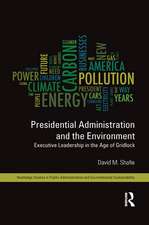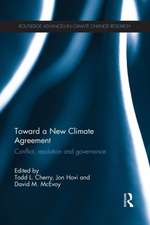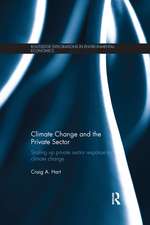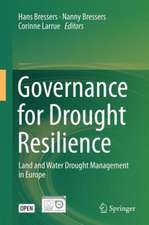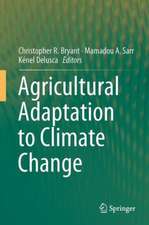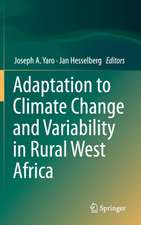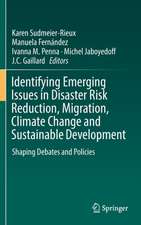Climate Justice: An Introduction
Autor Dominic Roser, Christian Seidelen Limba Engleză Hardback – 5 sep 2016
Using engaging everyday examples the authors address the core arguments by providing a comprehensive and balanced overview of this heated debate, enabling students and practitioners to think critically about the subject area and to promote discussion on questions such as:
- Why do anything in the face of climate change?
- How much do we owe our descendants – a better world, or nothing at all?
- How should we distribute the burden of climate action between industrialized and developing countries?
- Should I adopt a green lifestyle even if no one else makes an effort?
- Which means of reducing emissions are permissible?
- Should we put hope in technological solutions?
- Should we re-design democratic institutions for more effective climate policy?
| Toate formatele și edițiile | Preț | Express |
|---|---|---|
| Paperback (1) | 398.40 lei 6-8 săpt. | |
| Taylor & Francis – 5 sep 2016 | 398.40 lei 6-8 săpt. | |
| Hardback (1) | 1109.99 lei 6-8 săpt. | |
| Taylor & Francis – 5 sep 2016 | 1109.99 lei 6-8 săpt. |
Preț: 1109.99 lei
Preț vechi: 1353.64 lei
-18% Nou
Puncte Express: 1665
Preț estimativ în valută:
212.42€ • 230.66$ • 178.43£
212.42€ • 230.66$ • 178.43£
Carte tipărită la comandă
Livrare economică 23 aprilie-07 mai
Preluare comenzi: 021 569.72.76
Specificații
ISBN-13: 9781138845282
ISBN-10: 1138845280
Pagini: 240
Dimensiuni: 156 x 234 mm
Greutate: 0.48 kg
Ediția:1
Editura: Taylor & Francis
Colecția Routledge
Locul publicării:Oxford, United Kingdom
ISBN-10: 1138845280
Pagini: 240
Dimensiuni: 156 x 234 mm
Greutate: 0.48 kg
Ediția:1
Editura: Taylor & Francis
Colecția Routledge
Locul publicării:Oxford, United Kingdom
Public țintă
General, Postgraduate, and UndergraduateCuprins
Preface
1 Climate Change as an Ethical Challenge
Part I Do We Need To Do Anything at All? Moral Justification of the Need to Act
2 Three Reasons for Skepticism About the Duty to Mitigate Climate Change
3 Fundamental Doubts about Our Responsibility for the Future
4 Mitigation, Adaptation, or Climate Engineering—Do Many Roads Lead to the Desired Goal?
Part II How Much Do We Need to Do? Intergenerational Justice
5 Equality for Our Descendants
6 More for Our Descendants
7 Enough for Our Descendants
8 Uncertainty and the Precautionary Principle
9 Inequality and an Interim Conclusion
Part III How Should We Assign Responsibility? Global Justice
10 The Greatest Redistribution in Human History
11 Grandfathering: To Those Who Have, More Shall Be Given
12 The Polluter Pays Principle: Taking Responsibility for One’s Actions
13 The Beneficiary Pays Principle: Those Who Benefit Must Pay
14 The Ability-to-Pay Principle: To Each According to Her Means
15 Emissions Egalitarianism: Dividing up the Cake Equally
16 A Far-Reaching Proposal
Part IV From Ethical Theory to Political Practice
17 Non-ideal Theory: What to Do When Others Fail to Comply?
18 Population, Technology, Affluence: Three Strategies for Reducing Emissions
19 The Market for Emissions: A Modern Sale of Indulgences?
20 Procedural Justice: Democracy in Times of Climate Change
21 Looking Back and Checking Up With Reality
Glossary
Index
1 Climate Change as an Ethical Challenge
Part I Do We Need To Do Anything at All? Moral Justification of the Need to Act
2 Three Reasons for Skepticism About the Duty to Mitigate Climate Change
3 Fundamental Doubts about Our Responsibility for the Future
4 Mitigation, Adaptation, or Climate Engineering—Do Many Roads Lead to the Desired Goal?
Part II How Much Do We Need to Do? Intergenerational Justice
5 Equality for Our Descendants
6 More for Our Descendants
7 Enough for Our Descendants
8 Uncertainty and the Precautionary Principle
9 Inequality and an Interim Conclusion
Part III How Should We Assign Responsibility? Global Justice
10 The Greatest Redistribution in Human History
11 Grandfathering: To Those Who Have, More Shall Be Given
12 The Polluter Pays Principle: Taking Responsibility for One’s Actions
13 The Beneficiary Pays Principle: Those Who Benefit Must Pay
14 The Ability-to-Pay Principle: To Each According to Her Means
15 Emissions Egalitarianism: Dividing up the Cake Equally
16 A Far-Reaching Proposal
Part IV From Ethical Theory to Political Practice
17 Non-ideal Theory: What to Do When Others Fail to Comply?
18 Population, Technology, Affluence: Three Strategies for Reducing Emissions
19 The Market for Emissions: A Modern Sale of Indulgences?
20 Procedural Justice: Democracy in Times of Climate Change
21 Looking Back and Checking Up With Reality
Glossary
Index
Recenzii
"This book does an admirable job of guiding us through the maze of moral issues surrounding climate change. Its lucid style and use of examples from everyday life pin down the really important questions, and map out the philosophical territory to date around them. This is a perfect introduction to the complexities of climate change as the biggest moral challenge humanity has ever faced."
Catriona McKinnon, University of Reading, UK
‘Core principles are laid out comprehensively, with their different interpretations clarified. The book is also very user-friendly, containing excellent visual illustrations, chapter summaries, a glossary at the back, and lists of suggestive reading which are selective and therefore not overwhelming.’ -
Megan Blomfield, Environmental Values, The White Horse Press, 2017
‘Roser and Seidel assert that humans "have a moral duty to protect the climate" in their short, well-written book, Climate Justice.’
"How much should we do?" and "How should these duties be distributed?" These are the questions Roser and Seidel answer in Climate Justice with the aid of 17 augment boxes carefully placed throughout the book.
‘Climate Justice offers solid ways of turning moral convictions into political solutions.’
Sanganyado, Edmond. Book review, Integrated Environmental Assessment and Management, 2018. Volume 14, Issue 2, pp. 304-309.
Catriona McKinnon, University of Reading, UK
‘Core principles are laid out comprehensively, with their different interpretations clarified. The book is also very user-friendly, containing excellent visual illustrations, chapter summaries, a glossary at the back, and lists of suggestive reading which are selective and therefore not overwhelming.’ -
Megan Blomfield, Environmental Values, The White Horse Press, 2017
‘Roser and Seidel assert that humans "have a moral duty to protect the climate" in their short, well-written book, Climate Justice.’
"How much should we do?" and "How should these duties be distributed?" These are the questions Roser and Seidel answer in Climate Justice with the aid of 17 augment boxes carefully placed throughout the book.
‘Climate Justice offers solid ways of turning moral convictions into political solutions.’
Sanganyado, Edmond. Book review, Integrated Environmental Assessment and Management, 2018. Volume 14, Issue 2, pp. 304-309.
Descriere
The link between justice and climate change is becoming increasingly prominent in public debates on climate policy. This clear and concise philosophical introduction to climate justice addresses the hot topic of climate change as a moral challenge.
Using engaging everyday examples the authors address the core arguments by providing a comprehensive and balanced overview of this heated debate.
With chapter summaries, illustrative examples and suggestions for further reading, this book is an ideal introduction for students in political philosophy, applied ethics and environmental ethics, as well as for practitioners working on one of the most urgent issues of our time.
Using engaging everyday examples the authors address the core arguments by providing a comprehensive and balanced overview of this heated debate.
With chapter summaries, illustrative examples and suggestions for further reading, this book is an ideal introduction for students in political philosophy, applied ethics and environmental ethics, as well as for practitioners working on one of the most urgent issues of our time.





